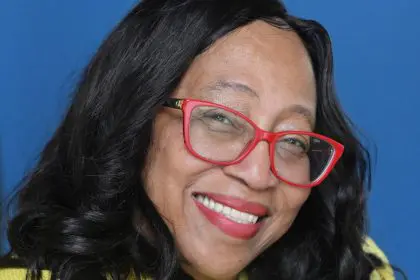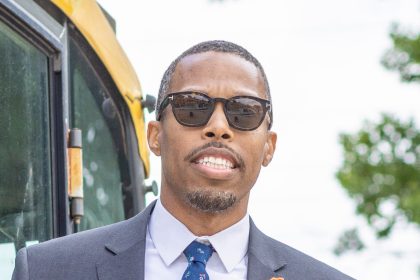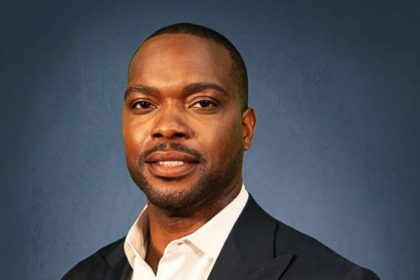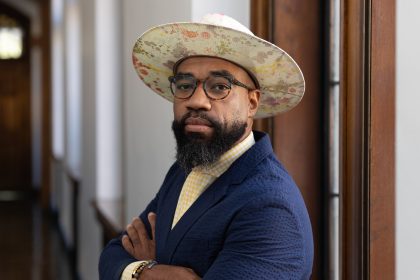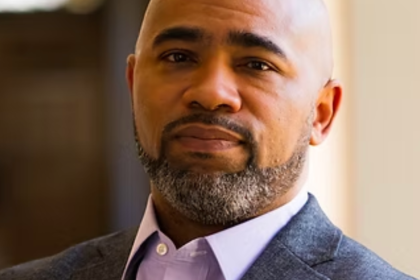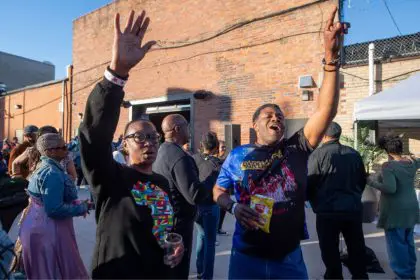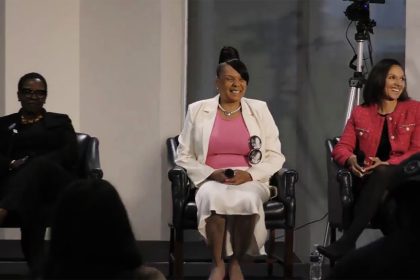Krysta Pate is the founder and CEO of The Ownership Initiative, a mission-based advisory firm working to improve Detroiters’ access to homeownership. She says her biggest advice for Black Detroiters interested in purchasing a home is to stop dismissing homeownership as unaffordable.
She learned about the secrets of homeownership from her job as a bank teller, and that opened a whole new world of possibilities to her. Now, she’s trying to open those possibilities to others and in her attempt to get the word out.
Pate spoke with rolling out CEO and publisher Munson Steed. Here is their recent conversation:
Why and how did you ever imagine being a CEO growing up in Detroit? And, what is the Ownership Initiative?
Well, let’s start here. I am like most Detroiters. When I grew up, became 18, I went off to college, and I decided that I was going to study biology. But I ended up coming back home for various reasons, and you just have to figure it out. When I figured it out, one of my friends told me that banking was a stable industry to be in, and so she got me a job as a bank teller back in 2001. From there, to save you the long details, I kind of took that on my own, started learning things, and envisioned myself helping the community. It’s a long road, but I got to a point where I wanted to launch my own business. I launched several community programs, and here I am with the Ownership Initiative, which is an impact advisory firm that helps get millions moved into the community through various programs normally run by the government, banks, or large nonprofits.
When you think about the Rocket Community Fund and its intention, what’s your experience? How do you see it transforming Detroit?
Well, I have had a behind-the-scenes view of what they’ve been doing for some time. I had the pleasure of designing the majority of the sales programs for the Detroit Land Bank, and we first worked together on Rehabbed and Ready, which is a partnership with the Detroit Land Bank. Boy, were they hands-on! I found that to be very interesting because it’s unlike many of the other funders or folks that I’ve worked with that just provide support. They generally don’t really jump into the details and the weeds in ensuring that the community design meets the standards to actually get money to the people that they donate to. I think that’s really cool about them. Since then, we’ve launched another program called Motor City Contractor Fund, and, of course, they’re big supporters of the Detroit Down Payment Assistance program as well.
How important is that first down payment to actually living your dream of home ownership?
Down-payment assistance in the city of Detroit is key. When I was helping the city come up with this idea, I was part of a team of consultants that were pitching various solutions to the city through a separate contract. I put three things on the table, and the one the city wanted to issue an RFP [a request for proposal] for was the down-payment assistance program. The reason why I did that was: I know that taxes, insurance, and the cost to get into a home for Detroiters is quite high. Down-payment assistance helps folks meet those requirements. Not only that, but the way I designed it to work with the banking system, being that I’m a career banker, it allows for down-payment assistance recipients to do other things, like interest rate reduction—buying down the interest rate.
We know interest rates are high right now, also principal reductions. So, using more than just your standard down payment, but seeing how we can make a home truly affordable. Down-payment assistance, especially in this market and this time, is extremely important, especially for African-American buyers, because we generally don’t have savings. I think it’s one of the greatest things I’ve done in my career, helping get this launched. The city of Detroit, compared to other municipalities, didn’t have the program at all for about 25 years. You can go into Oakland County, Wayne County, and they all have down-payment systems readily available. It makes the city itself more competitive when it comes to attracting homebuyers as well because we’re generating homebuyers out of our residents.
How important is just owning a home for that young family or that mother? What impact do you see? What are the accomplishments that people really need to know are possible when you design programs like you do for first-time homebuyers?
Being a home buyer is very, very important because it gives you a sense of control over your environment. Let’s start there. When you’re in a renting situation, your landlord can raise the rent. They cannot fix repairs on time. Various things can happen when you don’t own your property. Although owning a property has its own set of challenges, it’s something that puts you in the driver’s seat of how you control those outcomes. On top of that, it still is the best way to get to generational wealth. Some folks may argue in the economic world that buying a home may not be the fastest way to become rich anymore, but certainly for generational wealth, it’s very important. In fact, Detroit was one of the top 10 in the nation for home ownership, and we lost that through the great recession. To me, rebuilding that generational wealth that was lost is highly important because that’s where you make leaps and bounds as a community — building wealth over time. You certainly can’t do that if you’re renting.
Can you share with others how do you pitch big ideas that have a social impact?
For me, it’s all about helping others make their dreams come to fruition. It’s about listening. If you can’t listen to what the issues are that are affecting our community, affecting our people, you cannot provide real solutions. Once you hear those solutions, you have to get feedback. One of the things that my organization does is we actually listen to the issues, the challenges. We summarize the challenges, and then we go out to practitioners. We ask the practitioners in that field, “Is this true? What are you currently doing to solve that? How can we come together and community organize at an organizational level with top experts and professionals to create a solution that will reach the intended people that we’re trying to impact or the intended small businesses that we’re trying to impact?”
It takes a lot of listening, a lot of collaboration, and a lot of synthesizing of information to make it make sense. I was talking to one of my colleagues the other day about that. Quite honestly, I think my secret sauce is that you have to be a commoner or have lived a commoner lifestyle to have common sense. Sometimes you have these pie-in-the-sky types of ideas, but you have to make them practical.
If you were going to share at Wayne State, giving a commencement, or maybe a commencement at Spelman or Harvard or any other college, what would you challenge young people [who] want to delay until they’re 40 or 50 years old to think about buying a home? What would you say to them?
I would say think back to the Boomers generation and what home prices were then. You could get a home for $10,000 to $20,000, maybe $50,000 if it was a very expensive home. Then, think back to Generation X. You probably could get a home for $100,000, maybe $50,000. Then, we went through a great recession during the millennials. Now home prices are in the $200,000 range for a decent home. Prices are not going to go down. Even if there’s a dip, prices still increase. When you are on this earth 30 years from now, or 20 years from now, think about prices and where they will be then in real estate, in general. It’s definitely an economic decision and an important decision to get in as early as you can so you can ride the wave, but still end up with a gain in the end.
I guess you’re sharing with people about understanding a savings mentality. Being able to save money, being able to eat at home, how important is it for our community — particularly the Black community — to understand the importance of saving even $10? How do we create that relationship with our money [that allows] our dreams to be lived if we can become savers?
Saving is really an important topic of mine. I might say something that kind of ruffles feathers, but you’re saving to spend. If you really think about the principle of savings, all savings, no matter what it’s for, is to spend, whether it’s with this generation or the next. When you’re thinking about that $10 savings example, that could be simply, “I’m saving $10 a month to buy holiday gifts.” The reality is you have to set goals for yourself. Savings is more about the goal than the actual practice. It’s very hard to practice saving without that goal. Saving is very important on various levels.
I’ve illustrated that, but it’s very, very important for the African American community because we’re not the best at group economics. Our dollars circulate at a slower pace than other ethnicities and races. When you’re saving, you’re able to spend, if I could bring it home that way. Starting with that $10 to spend in your community or with a Black-owned business, etc., is very important to the progress and growth of our community. Most people think savings means putting up for a rainy day.
If you’re going to buy a home, if you’re going to get a mortgage, how important is it to also understand budgeting?
It’s very important to understand budgeting, especially nowadays when we don’t really do what former bankers or our elders were taught, which is sitting down with a pen and paper and balancing your checkbook. You might transfer something to save. You have to learn how to do that in a digital world. I would encourage folks to think about budgeting in a different way, sort of like how our generation is kind of quick with everything and shortcuts to everything.
A quick tip is one: you can have multiple checking accounts. Some people don’t know that. You should have purposes for your accounts. You should have a bill-paying account and a spending account. That’s a quick way to budget yourself or kind of control yourself because you only put so much in your spending account, and the rest is left for bills. You can get yourself out of a check-to-check cycle. That’s the bare bones of it. Once you’re out of that check-to-check cycle, you can start diverting money to your savings account off of what you don’t spend for your bills. That doesn’t become spending money, that becomes rainy day money to be spent later.
I have a unique perspective, but it’s a commonsense perspective because I don’t think anybody is really going to go and sit down. You might do it once a year—sit down and look at everything that’s coming in and out of your account. Try to get some balance, but you have to be able to think quick and fast and be on the go, just like our information age is taking us to.
As a CEO, what would you say to other young women and men as a CEO whisperer? What would you share with them about being a CEO that may or may not have ever been whispered in your ear that you’d like them to know about owning a business and moving our community forward?
It’s very different than being an employee in that it’s a whole different ball game. You probably recognize this, of course, if you transition from an employee. There’s a lot more things that you’re responsible for when you’re an entrepreneur. One thing I think someone should have told me — and I ended up hiring a small business coach to tell me this pretty early on, thank goodness — is that you have to have a sales plan. A lot of times as entrepreneurs, we have the product, we have the method, but we don’t give ourselves sales goals. If you don’t give yourself sales goals, then you don’t think about what you’re selling and how to package it so that it’s sellable. What I do is help others move millions into the community. That’s a very hard package to sell if you don’t make it something that’s easy to understand. I would say, if you’re an entrepreneur, after you figure out what you’re going to do, you have to figure out how you’re going to sell it and set goals for yourself to sell it.
Lastly, how do you set goals for yourself as a CEO? Where and how do you go about that process?
For me, I like to balance work and life. I start with literally how many hours I want to work in a year because I own an hourly consulting business. Outside of that, once I have my work hours set and the targets of what communities I want to help and have that line of business going, I start to set personal goals. One goal of mine this year is to lose more weight, spend more time with my family. I come from a very large family, so I started to set other goals because I don’t want to get so wrapped up in my business that I just become a robot, and that’s all I do. It’s very important to balance your life so that you can have a peaceful mindset, so you can actually do more effectively in your business because you have incorporated some type of rest and recovery.
If you just finish the sentence for me, I’d like to ask you a couple of questions.
I enjoy being a CEO because …
Of freedom.
My favorite book to read as a CEO is …
The Bible. I read it daily, and I meditate on the word to receive those instructions.
Two CEOs that you admire?
Wow, that’s an interesting question. You really got me on that one because I’m so caught up in what I do. You know what, I will say this: I admire — so he’s a former CEO, but he’s now chairman of the board, Gary Torgow, of Huntington Bank. It’s because I heard him give a speech in Tampa, Fla., at a Black and Latino economic summit, and he was aware that our communities do not have the language of banking and finance. That was very impressive.
The other CEO that I would select is from the hip-hop world — Joe Budden, from the Joe Budden Podcast. I was a listener from the early days, and I saw him grow that empire. He’s still figuring things out. It’s very motivational to someone like me who’s maybe in the fifth year in, thinking about the possibilities of where I could go. Even when I get to where I am, I’ll probably still have things I’m working on and trying to figure out, and it’s okay to do that.

